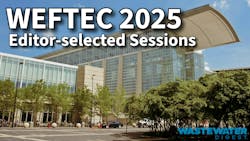Editor-selected sessions: Innovative approaches to microplastics, PFAS and flood mitigation at WEFTEC 2025
Wastewater Digest editors hand-picked sessions for WEFTEC 2025 in Chicago that follow current industry trends from microplastics and PFAS contamination to flood mitigation. Below is a list of topical sessions on some of todays hot topics.
Editor-selected sessions
Microplastics in Wastewater Treatment: Insights from Recent Research
Tuesday, September 30 8:30 a.m. - 10:00 a.m. McCormick Place, Room S402a - Level 4
WEF description: Discussions surrounding microplastics are picking up. Questions are mounting about sources, detection and analysis techniques. Are microplastics the next big contaminant? This WEFTEC session, broken into three parts, will review updated data on microplastics occurrence in WRRF's, identify how conventional filtration technologies remove microplastics, and describe the impact of solid stream treatment processes on microplastics accumulation in biosolids.
Tue. Sep. 30 | 8:30 AM - 8:45 AM – Microplastics Occurrence in Multiple WRRFs
Tue. Sep. 30 | 9:00 AM - 9:15 AM – WRF Project 5221- Impact of Solid Stream Treatment on Microplastics in Biosolids
Tue. Sep. 30 | 9:30 AM - 9:45 AM – Innovative Quantification of Microplastics in Digestate from Ontario Biogas Plants: Implications for Environmental Monitoring and Management
Tackling the PFAS Puzzle: Addressing Wastewater Effluent Concerns for Reuse
Monday, September 29 1:30 p.m. – 3:00 p.m. McCormick Place, Room N426b Level 4
WEF description: With PFAS now regulated in drinking water and an ongoing discussion for wastewater rules, the link between wastewater treatment and source water quality is under sharper focus. This WEFTEC session explores how effluent from municipal wastewater plants can contribute to PFAS loads in drinking water sources. Studies demonstrate that conventional media like GAC and IX underperform on their own in PFAS removal when faced with high levels of effluent organic matter. This session track explores pairing GAC or IX (and novel media) with conventional pretreatment steps reduced PFAS concentrations to non-detect levels for over 100 days. These insights are especially relevant for utilities pursuing indirect potable reuse, where wastewater effluent may become a future drinking water source. For utilities managing both source protection and treatment, these findings support a holistic, watershed-based approach to PFAS control, highlighting the importance of wastewater-side strategies in securing safe, compliant drinking water for the future.
Mon. Sep. 29 | 1:30 PM - 1:45 PM – The Technical and Economic Feasibility of PFAS Treatment in Municipal Wastewater Effluent
Mon. Sep. 29 | 2:00 PM - 2:15 PM – Leveraging Ozone-BAC Pretreatment to Improve PFAS Adsorption in Wastewater Effluent by GAC
Mon. Sep. 29 | 2:30 PM - 2:45 PM – Beyond the PFAS treatment Barrier: Key Lessons from an 18-Month Pilot on PFAS removal from Wastewater
Innovative Strategies for Urban Flood Mitigation in Combined and Separated Systems
Tuesday, September 30 8:30 - 10 a.m. McCormick Place, Room S501a - Level 5
WEF description: Join us for an engaging session that explores innovative strategies for urban flood mitigation through case studies from Lancaster, PA, Dearborn, MI and Alexandria, VA. Participants will gain insights into the challenges posed by combined sewer systems and learn how stormwater separation projects can help control flooding while reducing combined sewer overflows. We will delve into the use of optimization software to evaluate flood control technologies and discuss the integration of cloud-based tools in designing resilient infrastructure. This session emphasizes the importance of cost-effective solutions and interdisciplinary collaboration in addressing the impacts of climate change on urban flooding.
Tue. Sep. 30 | 8:30 AM - 9:00 AM – Leveraging the Cloud to Power Resiliency¦ Alexandria's Flood Defense
Tue. Sep. 30 | 9:00 AM - 9:30 AM – Lessons Learned from Separating Stormwater from Combined Sewers in Lancaster
Tue. Sep. 30 | 9:30 AM - 10:00 AM – Mitigating Unprecedented Flooding Through Optimized Evaluation With Multiple Design Storms
About the Author
Alex Cossin
Associate Editor
Alex Cossin is lead reporter, staff writer and content strategist for Waterworld Magazine, Wastewater Digest, Stormwater Solutions and Water Technology. Cossin graduated from Kent State University in 2018 with a Bachelor of Science in Journalism. Cossin can be reached at [email protected].
Mandy Crispin
Mandy Crispin is the editor-in-chief of WaterWorld, having joined Endeavor Business Media in 2023. She lives in Las Vegas, Nevada and is a graduate of University of Nevada, Las Vegas. She has internal and external corporate communications experience in disparate industries including online retail, gaming, plastics and is now enjoying exploring the water utility space. Crispin can be reach at [email protected].
Bob Crossen
Bob Crossen is the vice president of content strategy for the Water and Energy Groups of Endeavor Business Media, a division of EndeavorB2B. EB2B publishes WaterWorld, Wastewater Digest and Stormwater Solutions in its water portfolio and publishes Oil & Gas Journal, Offshore Magazine, T&D World, EnergyTech and Microgrid Knowledge in its energy portfolio. Crossen graduated from Illinois State University in Dec. 2011 with a Bachelor of Arts in German and a Bachelor of Arts in Journalism. He worked for Campbell Publications, a weekly newspaper company in rural Illinois outside St. Louis for four years as a reporter and regional editor. Crossen can be reached at [email protected].



